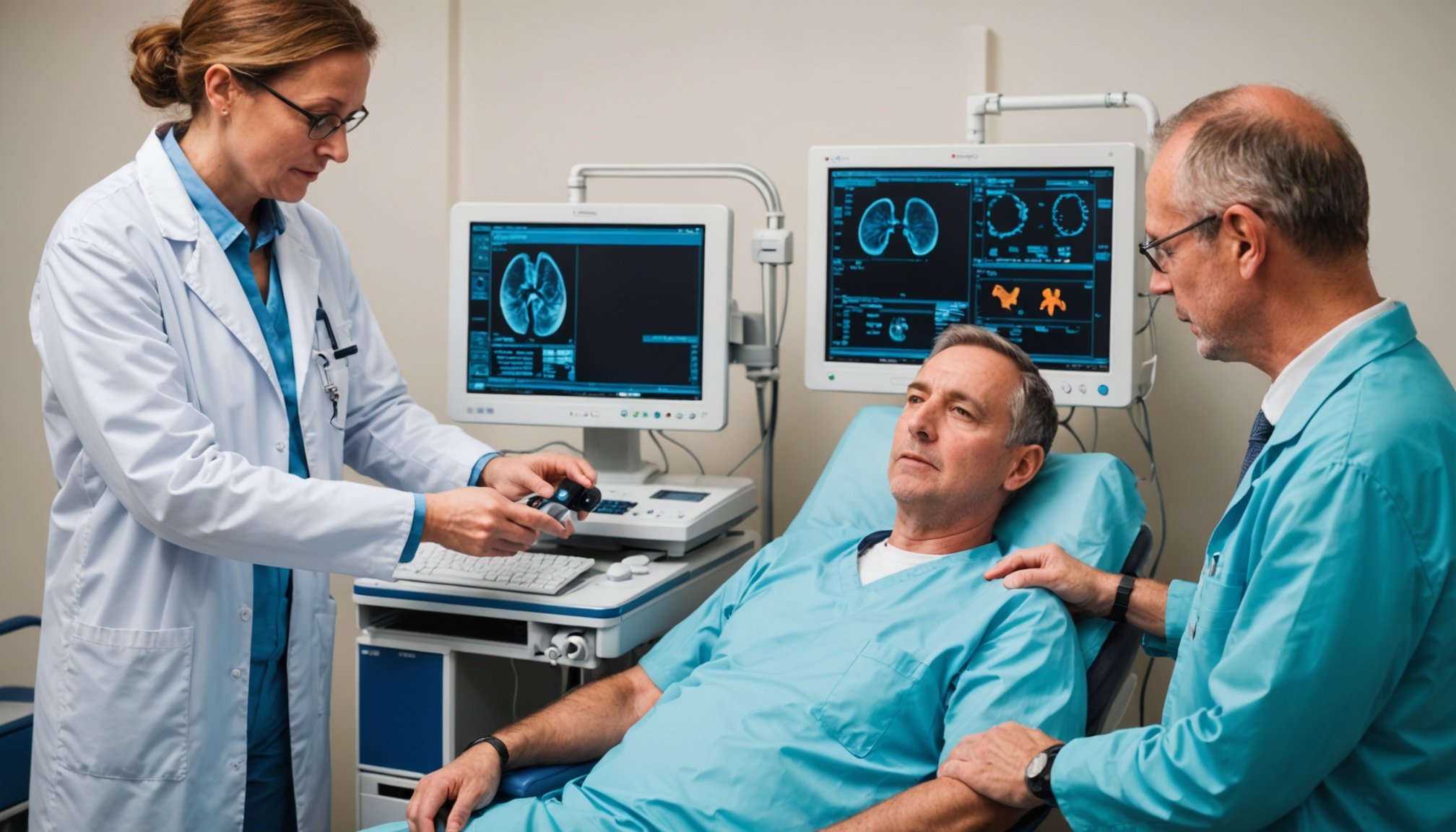Overview of Current Dialysis Practices
Dialysis practices have evolved remarkably with advancements focusing on enhancing patient well-being and adapting to nephrology trends. Current standards of care are paramount in improving patient quality of life. However, challenges persist, particularly in tailoring treatments to each patient’s unique needs while maintaining high-quality care.
Recent studies illuminate patient outcomes across various dialysis modalities. Modalities such as hemodialysis and peritoneal dialysis have distinct impacts on patients’ lives. For instance, home-based dialysis options offer more flexibility, potentially enhancing the quality of life. In contrast, in-centre hemodialysis may provide comprehensive medical support and monitoring. These outcomes are influenced by numerous factors, including treatment frequency and duration.
Also read : Exploring Innovative Strategies by UK Pain Specialists for Non-Opioid Management of Neuropathic Pain
Despite progress, nephrologists encounter several challenges in delivering patient-centered care. Balancing technological advancements with personalized treatment plans is difficult. Furthermore, developing holistic care strategies that encompass psychological and social dimensions remains a significant hurdle. Nephrology trends highlight the importance of integrating multidisciplinary approaches, fostering collaboration across healthcare teams to ensure comprehensive care.
Navigating these complexities, nephrologists strive to align dialysis practices with evolving patient needs, ensuring innovative solutions are met with empathetic, patient-centered care practices.
Also to read : Empowering Bilingual Children with Speech Delays: Insights for UK Speech-Language Therapists
Innovative Technologies in Dialysis
Dialysis technology continues to transform the lives of individuals with kidney diseases through groundbreaking innovation. As these advancements take shape, they significantly impact the field of nephrology, offering more effective methods for treatment.
Advances in Dialysis Machines
Recent innovations in dialysis machinery focus on improving efficiency and patient comfort. Enhanced filtration processes and compact designs are revolutionizing medical procedures, providing vital support with minimized discomfort. For instance, nephrology tools such as advanced sensors play a crucial role in refining treatment precision, ensuring that dialysis sessions are as comfortable and effective as possible.
Remote Monitoring Systems
Remote monitoring systems have improved patient management by offering real-time insights into their health status. These systems support continuous tracking of patients’ vital signs, allowing healthcare providers to adjust treatment plans proactively. The result is a more engaged and informed patient experience, which enhances compliance and overall health outcomes.
Home Dialysis Solutions
Home dialysis solutions offer patients flexibility and convenience, empowering them to integrate treatment into their daily routines. Despite their benefits, such as enhanced quality of life and reduced travel time, challenges remain. Effective use of home dialysis requires comprehensive training and support, ensuring patients feel empowered to manage their treatment with confidence.
Patient-Centered Care Approaches
In the realm of nephrology, patient-centered care plays a pivotal role in improving health outcomes by prioritising patient engagement and involvement. Strategies to enhance patient involvement in treatment plans include shared decision-making and personalised education sessions. By actively involving patients, providers can tailor care plans that align with patients’ values and lifestyles, thereby boosting compliance.
One critical aspect of this approach is effective communication. Transparent and open dialogues with patients help demystify complex medical information, fostering trust and understanding. Moreover, regular educational workshops empower patients with knowledge about their conditions, enabling them to make informed choices and adhere to their treatment regimens.
To further enhance patient-centered care, healthcare professionals must assess and address the psycho-social needs of individuals. This involves evaluating factors such as emotional well-being, social support systems, and financial stressors that may impact treatment adherence. Implementing these assessments can be advantageous, as they help identify barriers to compliance and guide more compassionate care solutions.
Ultimately, by adopting such strategies, nephrology practices can significantly improve patient satisfaction and health outcomes, promoting a collaborative and empathetic healthcare environment.
Integrating New Therapies in Dialysis Protocols
As the field of nephrology advances, incorporating innovative treatments into dialysis protocols has become essential. Dialysis therapies continue to evolve, aiming to improve patient outcomes and quality of life.
Nutritional Interventions
Dietary planning plays a crucial role in enhancing outcomes for dialysis patients. Implementing a tailored nutritional plan can help manage crucial factors such as potassium and phosphate levels, ultimately leading to better health and reduced complications. Modifying protein intake is often necessary, as it directly impacts the effectiveness of dialysis therapies, ensuring that patients maintain the right balance of nitrogenous waste.
Pharmacologic Innovations
New advancements in medications are transforming dialysis management. Contemporary drugs target specific issues, like enhancing anaemia management or controlling hyperphosphatemia and help stabilise patients’ conditions. These pharmaceutical developments allow for more personalised treatment plans and potentially reduce the reliance on frequent dialysis sessions.
Complementary Therapies
Exploring complementary therapies adds another dimension to patient care. Techniques such as acupuncture or guided relaxation can alleviate common issues like muscle cramps and anxiety. Incorporating these methods provides a holistic approach to treatment, allowing patients to experience better overall wellness alongside their traditional dialysis therapies.
Best Practices for Quality Improvement
Improving quality in nephrology practices is crucial for enhancing patient well-being. One significant approach is the implementation of evidence-based practices. In dialysis units, frameworks such as Plan-Do-Study-Act (PDSA) cycles have become instrumental. These cycles continuously test and refine methodologies, ensuring patient care processes are not only standardized but also optimized for better outcomes.
Continuous training and development of nephrology staff play a vital role in maintaining quality standards. Regular workshops and simulation-based learning can elevate staff competencies. This education not only keeps the medical staff updated on the latest nephrology advancements but also empowers them to offer innovative solutions to patients.
In the UK, numerous facilities have documented successful quality improvement initiatives. For example, a London-based nephrology unit fostered a culture of feedback and teamwork, reducing haemodialysis complications by 20% through stakeholder engagement. Another case involved a Birmingham unit integrating a digital monitoring system, which streamlined documentation processes and enhanced patient tracking accuracy.
By adopting these strategies, facilities can significantly boost their quality improvement efforts, ultimately leading to improved patient well-being and operational efficiency.
Evaluating Patient Outcomes and Satisfaction
Assessing patient outcomes and satisfaction in nephrology is vital for enhancing care quality and patient experiences. This process involves the use of diverse measurement tools and methodologies tailored to capture accurate insights into patient health and satisfaction metrics.
Measurement Tools and Methodologies
Tools such as patient surveys, health indices, and digital health records are commonly employed to quantify patient outcomes in nephrology. These methodologies are designed to capture comprehensive data on patient well-being, treatment effectiveness, and satisfaction levels. Effective tools provide actionable insights, thereby guiding healthcare providers in optimizing treatment protocols.
Continuous Feedback Mechanisms
Implementing continuous feedback mechanisms allows nephrology practices to refine their approaches regularly. Engaging patients through real-time feedback loops ensures that healthcare providers address concerns promptly, enhancing overall patient satisfaction. This open channel of communication fosters a more patient-centric care environment.
Outcome Tracking and Reporting Systems
Efficient outcome tracking and reporting systems are critical in nephrology to manage and analyse patient data effectively. They provide insights into trends, helping to identify areas for improvement and celebrate successes. Reliable systems ensure that nephrology assessment remains evidence-based, data-driven, and aligned with patients’ evolving needs, ultimately improving the quality of care.











